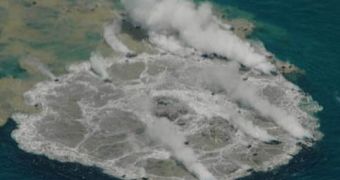By studying the consequences of the 2011 underwater volcano eruption near El Hierro Island, researchers can make accurate predictions about climate change, pollution and the ways in which these affect the environment.
This is due to the fact that, much like present day's global warming and carbon emission accumulations, erupting volcanoes heat up the area near them and raise the overall levels of air, water or soil acidity.
Therefore, it is believed that by investigating this matter one can draw conclusions regarding our world oceans' response to ever-increasing levels of greenhouse gases.
In the case of this particular volcano eruption, the water found just over the crater heated up by nearly 19 degrees Celsius (roughly 65 degrees Fahrenheit), and close to 90% of the oxygen dissolved in it simply disappeared.
Naturally, when faced with these new living conditions, the plant and animal species usually found in the regions where the eruption occurred have no choice but to either adapt or become extinct.
As this new study indicates, their options are virtually the same when it comes to global warming or pollution.
Therefore, in the case of these scenarios, regional biodiversity is to be altered both by the increased temperatures, and by changes in environmental chemistry.
Is spite of their being fully aware of this being bound to happen, what surprised researchers was how fast the natural world reacted to the slightest of changes.
Thus, Eugenio Fraile-Nuez, one of the specialists involved in this study, argued that “The physical and chemical response of the system was predictable, but we never have imagined that we would reach this magnitude.”
As he goes on to explain, the underwater volcano that erupted in 2011 south of El Hierro Island, Canary Islands, Spain, eventually killed almost all fish stock in the nearby waters.
Moreover, the species that did not die were forced to move away. In the end, only some phytoplankton was left.
Should climate change have similar effects on our natural world, it is quite likely that most marine and even land ecosystems will soon be destroyed.
More on this topic can be read on the Nature website.

 14 DAY TRIAL //
14 DAY TRIAL //